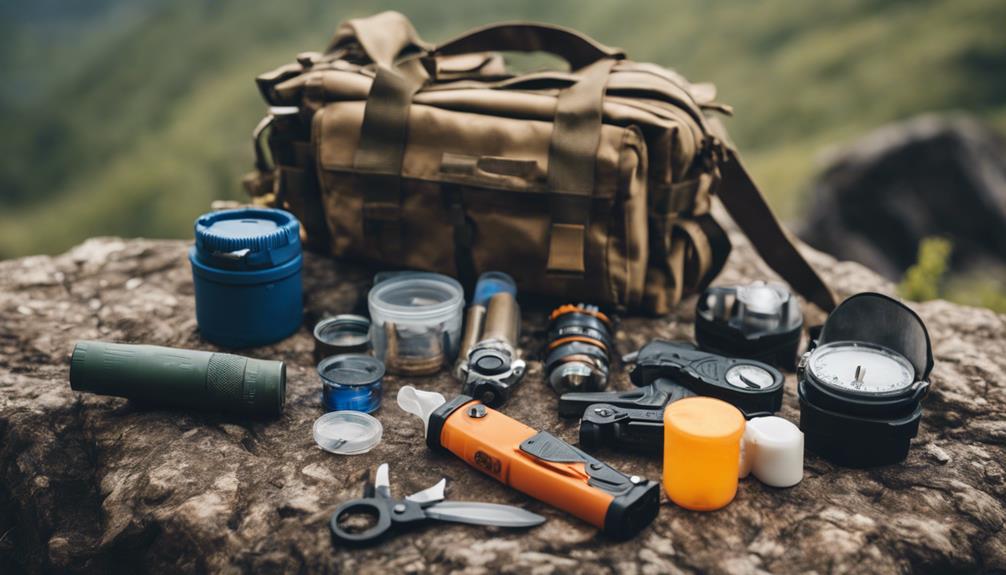Choosing your ultimate survival knife wisely means focusing on versatility and durability. You'll want a fixed blade for strength, with full tang construction for added stability. Look for thicker blades that can handle heavy tasks like prying and splitting. High-grade steel improves edge retention, ensuring your knife stays sharp longer. It's crucial to take into account local laws on blade lengths and types for responsible ownership. Clean and maintain your knife regularly to keep it in top shape. Want to know more about types, maintenance, and ethical purchasing? There's plenty to explore to find the perfect survival companion. When **choosing the best survival knife**, it’s also essential to consider ergonomics and handle material. A comfortable, non-slip grip can make a significant difference in challenging environments, especially when used for extended periods. Additionally, opt for a sheath designed for easy access while ensuring the knife remains securely in place during rigorous activities.
Key Takeaways
- Opt for a fixed blade design for durability and strength during heavy-duty tasks.
- Choose a knife with full tang construction for enhanced sturdiness and reliability.
- Select high-grade steel for improved edge retention and cutting precision.
- Prioritize versatile knife features over gimmicks to ensure practical survival use.
Knife Selection Essentials
When selecting a survival knife, you should always prioritize versatility and durability to confirm it meets your diverse needs in various situations.
A fixed blade design is essential, as it offers the strength and reliability necessary for heavy-duty tasks. Look for full tang construction, which assures the knife remains sturdy during use.
Blade thickness matters too; a thicker blade can handle prying and splitting without bending. High-grade steel enhances edge retention, while modern machining techniques improve precision.
Consider custom-made options for a personal touch, but remember that a well-worn knife can provide familiarity and trust.
Ultimately, choose a knife that balances practicality with performance, making sure it's ready for whatever challenges you might face.
The History of Survival Knives
Survival knives have evolved over centuries, reflecting the diverse needs and challenges faced by those who rely on them for everyday tasks and emergencies. From primitive stone tools to modern stainless steel designs, each era's innovations shaped how you view and use survival knives today.
Here's a quick look at key historical milestones:
| Year/Period | Knife Type | Notable Features |
|---|---|---|
| Prehistoric | Flint knives | Sharp edges for cutting |
| 19th Century | Bowies | Long blade, versatile use |
| WWI | Fairbairn-Sykes Knife | Iconic fighting knife |
| WWII | Survival utility knives | Compact, multi-functional |
| Modern | Tactical survival knives | Enhanced materials and design |
Understanding this history helps you appreciate the craftsmanship and functionality of your survival knife.
Understanding Knife Types

Understanding the different types of knives available can greatly impact your choice for survival situations, ensuring you select one that meets your specific needs and tasks.
Here's a quick overview of key knife types you should consider:
- Fixed Blade Knives: Known for their strength and stability, ideal for heavy-duty tasks.
- Folding Knives: Portable and easy to carry, perfect for everyday use.
- Multi-Tools: Combine various functions, enhancing utility during emergencies.
- Tactical Knives: Designed for specific survival scenarios, offering specialized features.
Selecting the right knife type focuses on functionality, ensuring it can adapt to your needs in various situations.
Prioritize practical designs over gimmicky features to enhance your survival experience.
Community Knowledge and Support
Community knowledge and support play an essential role in enhancing your preparedness and decision-making as a survivalist. Engaging with fellow enthusiasts can provide invaluable insights into knife selection, maintenance, and practical use. Sharing experiences and tips helps you make informed choices while building a support network.
Here's a quick comparison of community resources:
| Resource Type | Benefits |
|---|---|
| Online Forums | Access to diverse opinions |
| Local Meetups | Hands-on demonstrations |
| Social Media | Instant updates and trends |
| Workshops | Skill-building opportunities |
| Blogs/Podcasts | In-depth analysis and discussions |
Legal Considerations for Knife Use

Traversing the legal landscape around knife ownership and use is essential for responsible ownership and ensuring compliance with local laws. You need to know the regulations governing knives in your area to avoid potential legal issues.
Here are some key points to evaluate:
- Blade Length: Check your local laws about maximum blade lengths for carry and use.
- Type of Knife: Certain types, like switchblades or daggers, may have stricter regulations.
- Public Carry: Understand where you can carry your knife—some places may prohibit knives altogether.
- Self-Defense Laws: Familiarize yourself with the self-defense laws in your jurisdiction, as they can impact knife use.
Being informed protects you and promotes responsible knife ownership.
Safety Protocols and Maintenance
Maintaining your knife properly is essential for ensuring its longevity and effectiveness in survival situations. Start by cleaning your knife after each use to prevent rust and corrosion. Regularly sharpen the blade to keep it effective. Always store it in a dry place, ideally in a sheath or protective case. Use gloves when handling the knife to avoid accidents, and always cut away from yourself.
Here's a quick reference table for safety protocols and maintenance:
| Task | Frequency | Tool Needed |
|---|---|---|
| Clean the knife | After each use | Cloth, soap, water |
| Sharpen the blade | Monthly | Sharpening stone |
| Inspect for damage | Weekly | Visual inspection |
| Store properly | After use | Sheath or case |
| Wear gloves | Always | Safety gloves |
Ethical Purchasing Practices

When selecting a survival knife, it's crucial to reflect on ethical purchasing practices that support responsible manufacturers and sustainable materials. By being mindful of your choices, you can contribute to environmentally friendly practices and fair labor conditions.
Here are some key points to take into account:
- Research the Manufacturer: Look for brands that prioritize ethical production methods.
- Check Materials: Choose knives made from sustainably sourced materials, like recycled steel.
- Support Local Artisans: Opt for knives crafted by local makers who adhere to ethical practices.
- Review Certifications: Seek products with certifications indicating sustainable or ethical production.
Frequently Asked Questions
What Is the Best Blade Length for a Survival Knife?
The best blade length for a survival knife typically ranges from 4 to 7 inches. This size balances versatility and control, allowing you to tackle various tasks without sacrificing maneuverability or ease of use.
How Do I Choose the Right Handle Material?
When choosing the right handle material, consider grip, durability, and comfort. You'll want materials like G10 or Micarta for strength and moisture resistance. Test different options to find what feels best in your hand.
Are There Specific Brands Known for Quality Survival Knives?
Like a compass guiding your way, brands such as Ka-Bar, ESEE, and Benchmade stand out for quality survival knives. Their craftsmanship guarantees reliability, making them trusted companions for any adventure you undertake.
How Do I Properly Sharpen My Survival Knife?
To properly sharpen your survival knife, use a whetstone or honing rod. Maintain a consistent angle while sliding the blade across the stone. Regularly check the edge's sharpness, ensuring it remains effective for various tasks.
Can I Carry My Survival Knife in Public Places?
You can carry your survival knife in public, but it depends on local laws. Always check regulations to verify compliance, and consider the knife's size and visibility to avoid unnecessary attention or legal issues.
Conclusion
Choosing your ultimate survival knife is like picking a trusted companion for life's unexpected adventures.
With the right blade in hand, you're not just equipped for survival—you're ready to carve your path through challenges and forge unforgettable memories.
As you weigh your options, remember that this knife isn't just a tool; it's a lifeline, a piece of history, and a reflection of your journey.
So, choose wisely, and let your knife be your guiding star in the wild.










